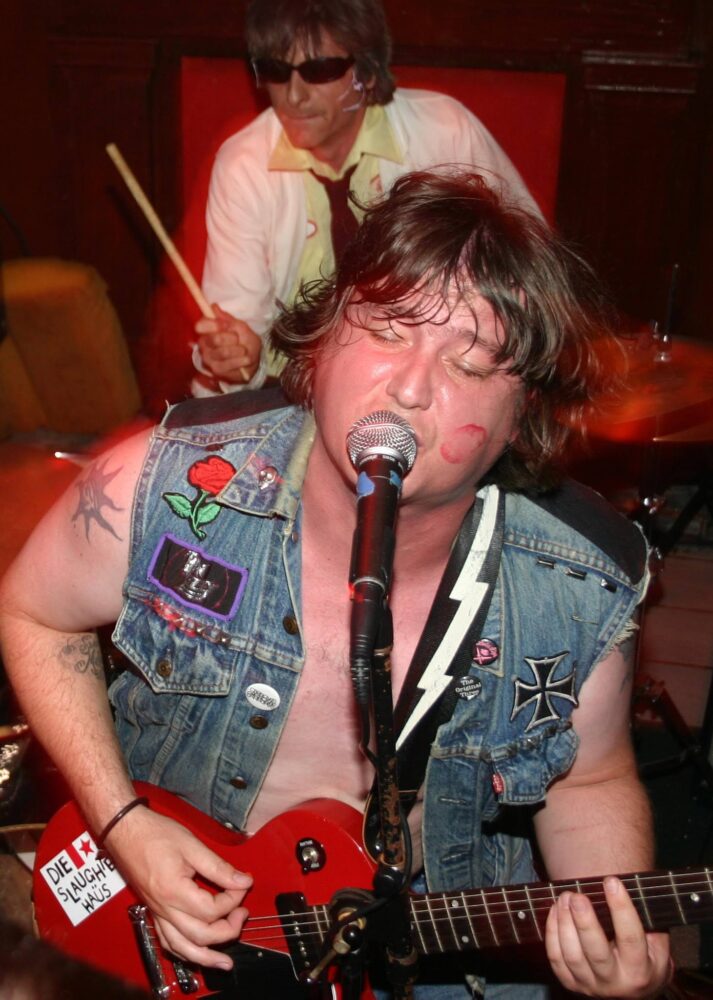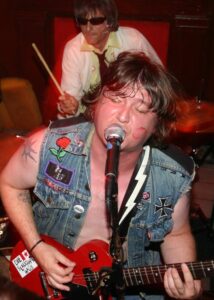Magazine
Between the Guitar Solo and the Ooh-La-La
Farewell to King Louie Bankston
Published: November 29, 2022
Last Updated: February 28, 2023

Photo by Gary LoVerde
Bankston performing at Circle Bar, Halloween 2004.
Born December 18, 1972, in Jefferson Parish, Louis Paul Bankston grew up in Harahan and immersed himself in the grassroots punk-rock and skateboarding culture of the late ’80s, even prevailing upon his parents to add a skate shop to the family business, Louie’s River Ridge Ace Hardware on Jefferson Highway. DIY hardcore punk, heavy metal, and skating made up his rough-and-tumble world of teenage kicks, where it was easy to bruise, bleed, or break something, but there was a world of friends ready to pick you up or patch you up to go around again. As a songwriter, Bankston eventually channeled that intensity through the musical styles that express the high-stakes, crashing heartbreak and thrumming joy of raw, young emotion the best: raggedy, swaggering guitar-driven garage rock, shot through with just the right amount of pop sugar to demonstrate that his heart was true, the night could go on forever, and the highway would never end. In a 2011 interview for the Times-Picayune, Bankston explained to me that joy and passion were, at the end of the day, his driving interests as an artist, using grunge, the dominant sound of his generation, as a jumping-off point. “I’ve never been a grunge-rocker. It just seemed like a lot of people trying not to have fun. Not having fun is one thing, but actually putting effort into not having fun? It’s just no fun.”
“Let’s just find a way,” he went on, “maybe in between the guitar solo and the ooh-la-la—there’s got to be some happiness there.”
Beyond his beginnings in hardcore punk and other forays into harsher sounds, Bankston pretty much made his permanent address between the guitar solo and the ooh-la-la. His ear for rock-and-roll songcraft—melodic, romantic, winkingly dangerous—made him an icon in the semi-underground garage-rock world. Particularly so in the parts of it that were concentrated in New Orleans, Detroit, and Memphis, unwealthy towns where American rock, soul, and rhythm and blues were forged in their earliest forms and where young musicians tended to stay and build eccentric, history-aware scenes, merging vintage sounds with occasional tinges of distortion, or synthesizers, or classic-rock bombast. After a run of punk-adjacent experiments called the Intelligenitals, the Lame Ones, the Clickems, the Harahan Crack Combo, and probably more projects which have been lost to the sands of time, arguably his first proper band—formed when he was still a teenager—was the Royal Pendletons. A retro organ- and guitar-driven quartet that studiously aped the clean-cut look of ’60s-era frat-rock bands in natty blazers of its namesake plaid, the Pendletons covered delirious, fuzzy old cuts from underground bands of yore like Suzi Quatro’s Pleasure Seekers, ? and the Mysterians, the Downliners Sect, and the Jesters of Newport, played alongside originals in the same vein. Fellow Pendletons included J. Matthew Uhlman of the more than twenty-year-old New Orleans record hop Mod Dance Party, restaurateur Tommy Oliver, and author Michael Hurtt, whose latest book is a history of Detroit’s influential Fortune Records label that weighs almost five pounds.
Through prolific touring, largely on the DIY independent circuit, Bankston cultivated a national and international network of friends and fans—although, like a lot of New Orleans icons, he remained more of a broad influencer, a cult classic, or a secret password to those in the know than a bona fide celebrity in his own right. He collaborated with a laundry list of other underground Southeastern icons, including members of the Oblivians, breakthrough Memphis punk Jay Reatard, and Quintron and Miss Pussycat. Alex Chilton, the transplanted Box Tops pop star and Big Star legend turned New Orleans oddity and local scene fixture, produced the Royal Pendletons’ first album, Oh Yeah, Baby, in the late ’90s. His uncharacteristic experiment in living outside of Louisiana led to what was maybe both the most unlikely but also one of the most well-known King Louie projects: in the early 2000s, he crossed the country to work with Portland, Oregon, band the Exploding Hearts, co-writing most of the songs on the band’s 2003 album Guitar Romantic. The indie power-pop classic proved to be its only full-length release. After Louie quit the band and returned to New Orleans—making a remarkable choice, as Pitchfork noted in its obituary, not to join them in seriously pursuing what looked like impending mainstream success—three of the Exploding Hearts band members were killed when their tour van flipped over on the highway.
It wasn’t the first or the last time that King Louie, who struggled with substance use, health issues, and the associated wear and tear of a rock-and-roll life, would cheat death. Throughout it all, he remained beloved by a supportive family—particularly his mother, Elaine Bankston—and a deeply committed New Orleans community. He also stayed creatively prolific, making most of his eulogies into projects like the raw, jangly Loose Diamonds, the Thin Lizzyish Black Rose Band, and the power-pop Missing Monuments—plus the duo Terry & Louie, a reunion with the surviving Exploding Heart, Terry Six.
One of his most-loved projects turned out to be the jokey, hard-to-define mid-2000s project King Louie One Man Band, a solo effort that at times sounded as if everyone else had gone to bed and Bankston was left only with the pleasure of his own racing creative engine and goofy sense of humor. But this exercise produced work that those who knew him well place at the top of their lists of Louie memories, songs that felt like their friend was being the most himself that he could be. That the King Louie One Man Band was so universally celebrated was a little bit ironic: who could imagine this famously collaborative artist, who cultivated and cared for so many friends and connections, would ever need to be alone?
A columnist since 2016, Alison Fensterstock has written for 64 Parishes about music, dogs, witches, hippies, and other things.
